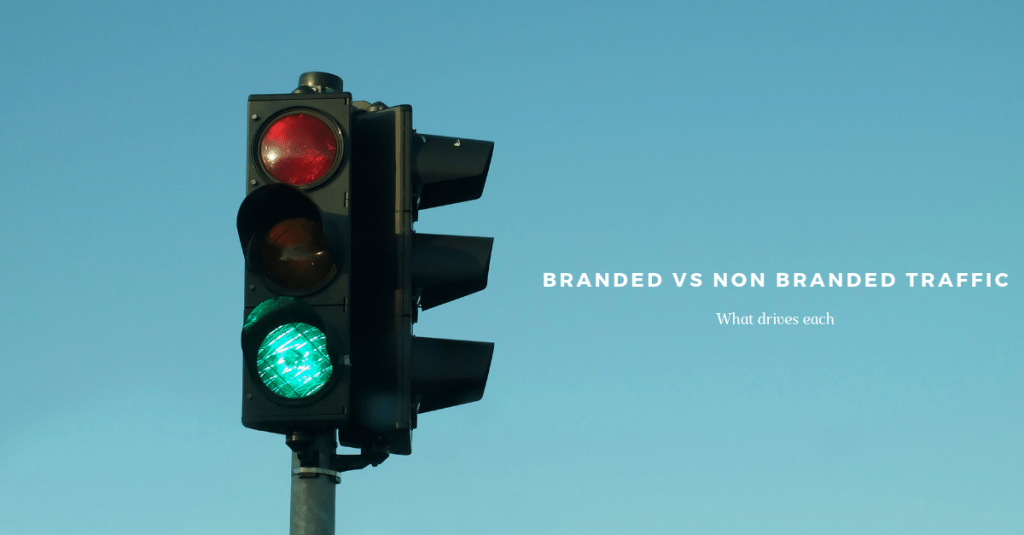
Those of us who utilize our online presence know that keywords are vital to our success. Branded Traffic and Non-Branded Traffic each have their own significance and are each driven by their own respective keywords. Continue reading to learn more about when to use and optimize each.
Branded Traffic
As web analytics continue to become detailed and complex. That does not mean, however, that optimization of your website has to be. By focusing on what style of keywords you use drives what type of traffic, your website can begin to climb the search rankings.
Branded Traffic comes from branded keywords that your website dominates. It includes your company or website’s brand name or variations of it. It is also unique to your domain. For example, “Whole Foods” should be and is the top ranked search when typing in those two words.
Those who search for your company’s branded keywords show a distinct interest in your company. Most of the time, these consumers are already familiar with the products you offer.
Branded Traffic is not a function of SEO efforts. Especially if your company’s name is unique, you should be ranking high in searches. The more branded terms that people search for you and that you have, the better brand recognition your company has.
There are certain exceptions to when keywords are not considered branded traffic. For example, Whole Foods sells “Driscoll Strawberries”.
Let’s use the keyword phrase “Driscoll Strawberries” for an example. If one searches that exact term, a result could appear that links to Driscoll Strawberries on a Whole Foods webpage. In this instance, the term “Driscoll Strawberries” would not be branded traffic for Whole Foods. This is because the user is not necessarily looking to buy Driscoll Strawberries at Whole Foods.
Non-Branded Traffic
Non-Branded Traffic comes from non-branded keywords that do not reference the brand name (or any part of it) for a company or website. There are many keywords that do have a brand name within the phrase but is not unique to one particular brand or domain.
For example, by searching “healthy grocery store” you are not referencing Whole Foods but very well may find it in the search query. One could even search “recipes that contain whole foods”. Their intent may simply be to find healthy recipes and not to search for the store. However, search results for Whole Foods will appear high up in the rankings for this searhc query.
The options for non-branded can nearly be limitless. No two brains think exactly alike so how they search for a product or brand will most likely differ as well. However, your strategy should not be to try and rank for a copious amount of keywords. Start by picking 10 keywords that you truly feel embody your company and work on climbing the rankings with them.
Non-Branded Traffic gages the health of your company’s SEO strategy efforts. A Non-Branded keyword search query does not include your brand name or any part of it. This includes any misspellings.
It is important to analyze what type of traffic drives the most consumers to your website. Often, this represents the majority of your websites new and unique visitors. Non-Branded traffic is truly where the value of your SEO strategy shine.
Which type of keyword performs better?
Now you know the basics of the differences in branded and non branded keywords and how each drives its own traffic. However, we at Pulse Digital Advertising know you are probably wondering which performs better. The answer, however, truly lies in what type of results you are striving to receive from a marketing campaign.
If you are simply going for brand awareness, non-branded keywords may be the route for you. In most cases, more people search for “strawberries” than a certain brand of strawberries.
When utilizing non-branded keywords for your business, you will not only gain brand awareness but also visibility and increased website traffic.
However, non-branded keywords are typically harder to top the search engine rankings with as they have a much higher search engine volume.
The advantage of branded keywords can lie in how relatively low the cost-per-click (CPC) of a branded keyword can be. If not executed properly, however, the cost of branded keywords can add up. If no one is searching for your particular strawberry business, maybe it’s time to start honing in on particular non-branded keywords or other awareness campaigns.
Recap
Branded and Non-Branded keywords are what drive your Branded and Non-Branded traffic. Each have their own successes, costs, and difficulties. It is important to first analyze what type of traffic you are trying to drive. Then, decide on which type of keywords you want to focus on for a campaign.
Request a free consultation from Pulse Digital Advertising and get insights into where your traffic is being driven from.